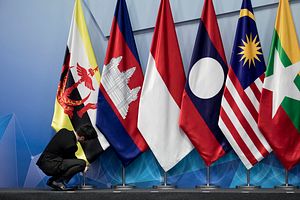The recent visit by President of China Xi Jinping to Brunei marked the strengthening of Brunei-China relations. But only a few days earlier the U.S. Navy carried out its 24th annual Cooperation Afloat Readiness and Training (CARAT) maritime exercise at Brunei’s Muara Naval Base. Is Brunei playing these two great powers to its advantage or is it stuck in an ever-complicated geopolitical game, caught amid great power rivalry?
The answer is complex. Being a microstate, Brunei cannot escape the actions of the great powers in the region, particularly in the context of the rivalry between the United States and China. Both have been aggressive in asserting their dominance in the Asia-Pacific. As a small nation-state, Brunei can thrive best only through diplomatic and trade talks, albeit without making too much of an impact on the actions of the United States and China.
Brunei’s friendship with the United States is still strong. It still relies heavily on American military protection in the region and depends on international law to sustain and guarantee its sovereignty and independence. It is the United States that can sustain this status. Such was the importance of the United States to the country’s security that in 2013 the Sultan of Brunei flew himself to Washington to meet then-U.S. President Barack Obama.
However, the introduction of Sharia in the same year also caused global condemnation by the West. The endless barrage of bad news led to the boycott of Brunei government-owned hotels and properties by celebrities such as Jay Leno. The more recent rise of U.S. President Donald Trump — and the whiff of Islamophobia that came with him — only makes Brunei’s position and image more troublesome. These factors dented American soft power appeal for the sultanate.
Meanwhile, China is fast becoming a crucial economic partner to the country. China becoming the biggest investor in the Brunei economy has alleviated short-term problems such as rising youth unemployment. The $12 billion Hengyi petrochemical plant is also a testament to the reliance on investments needed to keep the economy stable in the post-oil 2013 crash. Xi also announced a joint partnership between the two countries to drill oil in the heavily contested South China Sea.
Unfortunately, China’s overtly aggressive stance in the South China Sea, with its military base build-up, may affect Brunei’s relations with its ASEAN counterparts. Being seen as too friendly to China may only end up alienating Brunei among ASEAN member states that have claims in the South China Sea. They are also relying heavily on the ASEAN “centrality” and unity to push back against China’s geopolitical influence in the region, which can be affected if Brunei refuses to cooperate.
A host of complex situations have influenced and will continue to influence Brunei’s foreign policy. It is never easy to identify the motif of a nation-state especially in regards to its relations with other countries, or in this context between Brunei, China, and the United States.
But if there is one motif for Brunei allying itself with these big power states, it is to ensure its survivability will be guaranteed well into the future as a sovereign independent state. The big power that can offer this will be the clear winner in securing Brunei’s partnership, and move a step closer in securing geopolitical dominance in the Asia-Pacific.
At this point, however, it is still unclear which has the most influence in Brunei. Only time will tell.
Abdul Malik Omar is the principal partner of Herodotus & Co Consulting. He graduated from LSE for his MSc in Economic Development in 2016. He is also a regular contributor to Brunei’s Borneo Bulletin and HK’s Investvine.com.

































